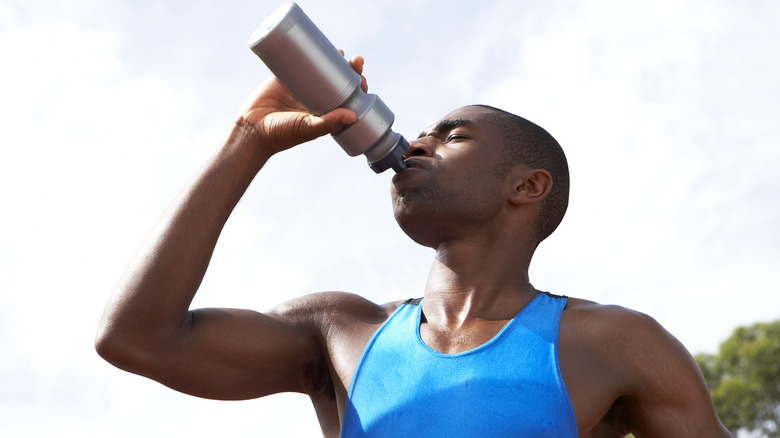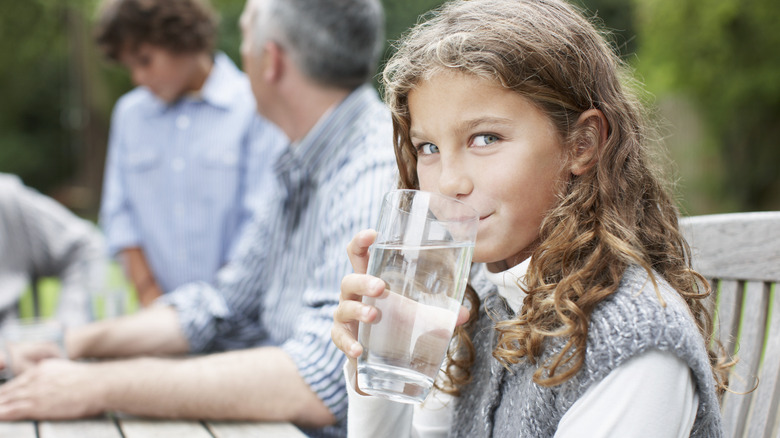Are Electrolytes Actually Important For Hydration?
We've been conditioned by sports drink advertising to think of electrolytes as important for hydration, but there still seems to be a bit of mystery regarding what electrolytes are, and what their function is in our bodies. It's actually pretty complicated, and although electrolytes are very important when it comes to hydration, you may be surprised to find out that electrolytes themselves don't actually hydrate us — at least not directly.
In terms of composition, electrolytes are easy to explain. They're really just water-dissolved ions from minerals like calcium, magnesium, potassium, and sodium (aka salt) that exist naturally in our bodies where they serve an important role as chemical conductors, facilitating the regulation of various essential functions. When we say essential functions, we're talking about the proper working of our heart, our muscles, and yes, the regulation of our fluid balance. If it weren't for electrolytes, in other words, we'd die. And while they don't actively hydrate on their own, they do help the body stay hydrated in interesting ways.
So that's what electrolytes are, and why they're important. But how do they work? That's where things get complicated because to understand the workings of electrolytes, one first has to understand concepts like osmosis and blood osmolarity. Neither is particularly easy to explain, but here's a crash course.
How electrolytes impact hydration
Hydration in the body requires water. But before that, first, we need a specific electrolyte. Here's how it works: Everything we eat or drink is processed by the gastrointestinal tract. When two things exist together in this tract — sodium and sugar (aka glucose) — a chemical process is activated (called the sodium-glucose cotransporter) that allows these two elements to be absorbed through the cellular walls of the gastrointestinal tract and enter the bloodstream.
When sodium and glucose are absorbed into the bloodstream, that causes a change to the composition of our blood, or what's called its osmolarity. Because this increases the level of electrolytes in our blood, the body is obliged to release more water into the bloodstream to restore normal fluid balance. How does this happen? Well, this is where osmosis comes into play. For water to be transported to the bloodstream, it has to be pulled from other parts of the body — where it's constantly being replenished — and travel through what are known as semipermeable membranes – which is to say, cell walls that are only breachable by molecules like water. That's osmosis.
So the introduction of electrolytes – specifically, sodium — does ultimately affect hydration. But electrolytes don't themselves hydrate. They're part of a larger process that restores our fluid balance.
The process of maintaining proper electrolyte levels
What can we do to boost our electrolytes in aid of hydration? Consuming the proper sorts of beverages helps, particularly during and after periods of intense exercise, as our bodies lose electrolytes through sweat.
Sports drinks like Gatorade, which made the relationship between electrolytes and hydration famous, are effective replenishers. But sports drinks are also noted, in some cases, for having excessive added sugars, so they're not necessarily the best choice for replenishing electrolytes (per Healthline). Coconut water and milk, a surprisingly hydrating beverage, are both considered healthier options with lots of electrolytes.
Drinks aren't the only avenue to get hydrated, however. Plenty of foods are rich in electrolytes, too, including meat, fish, nuts, grains, fruits, and vegetables. It depends on the specific mineral — spinach and other greens, for example, are noted for their magnesium content — but many healthy foods are helpful in this regard. Of course, foods can also be used to hydrate, too. Many fruits and vegetables are almost entirely made up of water, which adds to their hydrating power.



